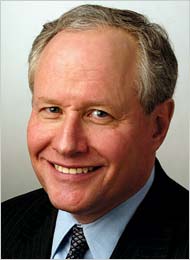HETEROPHOBIA?
Dean Esmay is bemused:
The Blair government is being criticized by gay rights advocates as “heterophobic” for its proposed “Civil Union” legislation. Apparently, for some, compromise is not acceptable–it’s the whole ball of wax or it’s nothing at all.
Bill Kristol recently suggested that within a few years, in America, it’s quite possible that the legal idea of “marriage” will become nothing but a contractual one, with only the private sphere (church and family) defining anything else about it. Would that be a bad thing? I think not, and I imagine it’s where the Brits are probably headed too.
Because I tend to view these issues through a libertarian-utilitarian-secular lens, I would agree. But I don’t begrudge Kristol and others who view the world from a deeply religious perspective their vision, either. Indeed, one of the things secular humanists forget is that others have every bit as much a right to organize and fight for their position as we do. While we live in a secular state and no one has the right to impose their religion on us, it is perfectly legitimate for people to act on their religiously-inspired sense of morality in advocating public policies. Just as the majority ruled in Romer v. Evans that homosexuals have a fundemental right to organize to fight for preferential treatment, so do fundamentalist Christians or devout Jews. Being in the majority doesn’t preclude one’s right to try to impose their will on others, so long as the boundaries of the Constitution are observed.






If you look at a pointillist painting up close, you see it is just composed of a bunch of small dots and your brain has a hard time envisioning what the image is or why it is even considered art.
Likewise with marriage, get too close to the thing, approach it only with the right half of your brain (as Kinsley does–wonders never cease, he’s either irrational or hyperrational) and it makes no sense. Well, let’s just get rid of the thing.
But let’s approach the question from a strictly rational perspective for a moment: we know that married people live longer and are less prone to depression (well,at least men)–chalk one up for public health. We know that children benefit from stable two-parent families and that couples who marry (though they may divorce) tend to stay together longer than those who don’t–one for child welfare and societal stability. We also know the poverty level for women and children to be much lower amongst married families. Well, you get the point.
Now, while I am all in favor of the state staying out of everyone’s bedrooms, and I am happy to have stable gay couples’ relationships recognized through civil unions, and I will even applaud their efforts to create families through adoption, etc. (why should straight people have all the “fun”) I WILL not accept either the premise that gay people can “marry” or that marriage itself is outdated.
This is akin to saying that since everyone can’t have Porsche, all Porsche’s should be destroyed.
I have to admit, I was pulled up short last week when I heard a conservative critic of the Lawrence decision say that this opened the door not only to gay marriage but to bigamist and polygamous marriages. After all, if the state has to foreswear a marital law rooted in Christian mores (one woman one man–God says so) where is the justification for telling Mormons and Muslims they cannot have four wives (provided everyone is of age and consents)?
I know from studying non-western history that polygamy has mostly been a bad thing for societies that practice it, but would that matter if you could argue (as they could) that it is established practice and religiously sanctioned among certain groups? That to not allow such marriages would be unfair persecution of minorities?
This is deceptively tricky subject and I’m not looking forward much to what comes next.
Thankyou for writing the exact thoughts I was trying to convey to a friend last evening, who was arguing that gays should have a right to traditional marriage. Because you said it so much better than I did when your wrote this:
“Just as the majority ruled in Romer v. Evans
that homosexuals have a fundemental right to organize to fight for
preferential treatment, so do fundamentalist Christians or devout Jews.
Being in the majority doesn’t preclude one’s right to try to impose their
will on others, so long as the boundaries of the Constitution are
observed.”
I stole it and sent it to him.
🙂
Kate
—